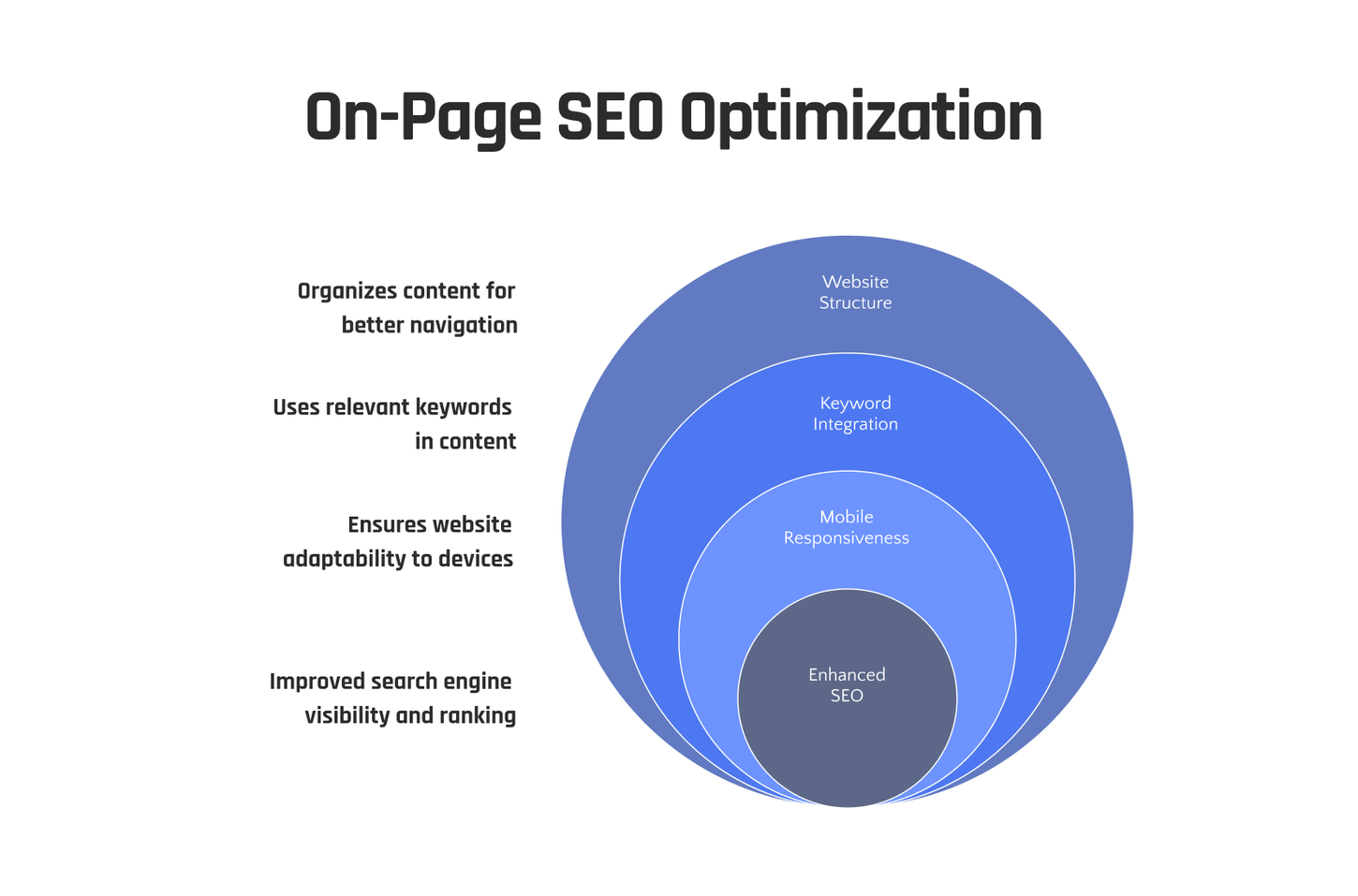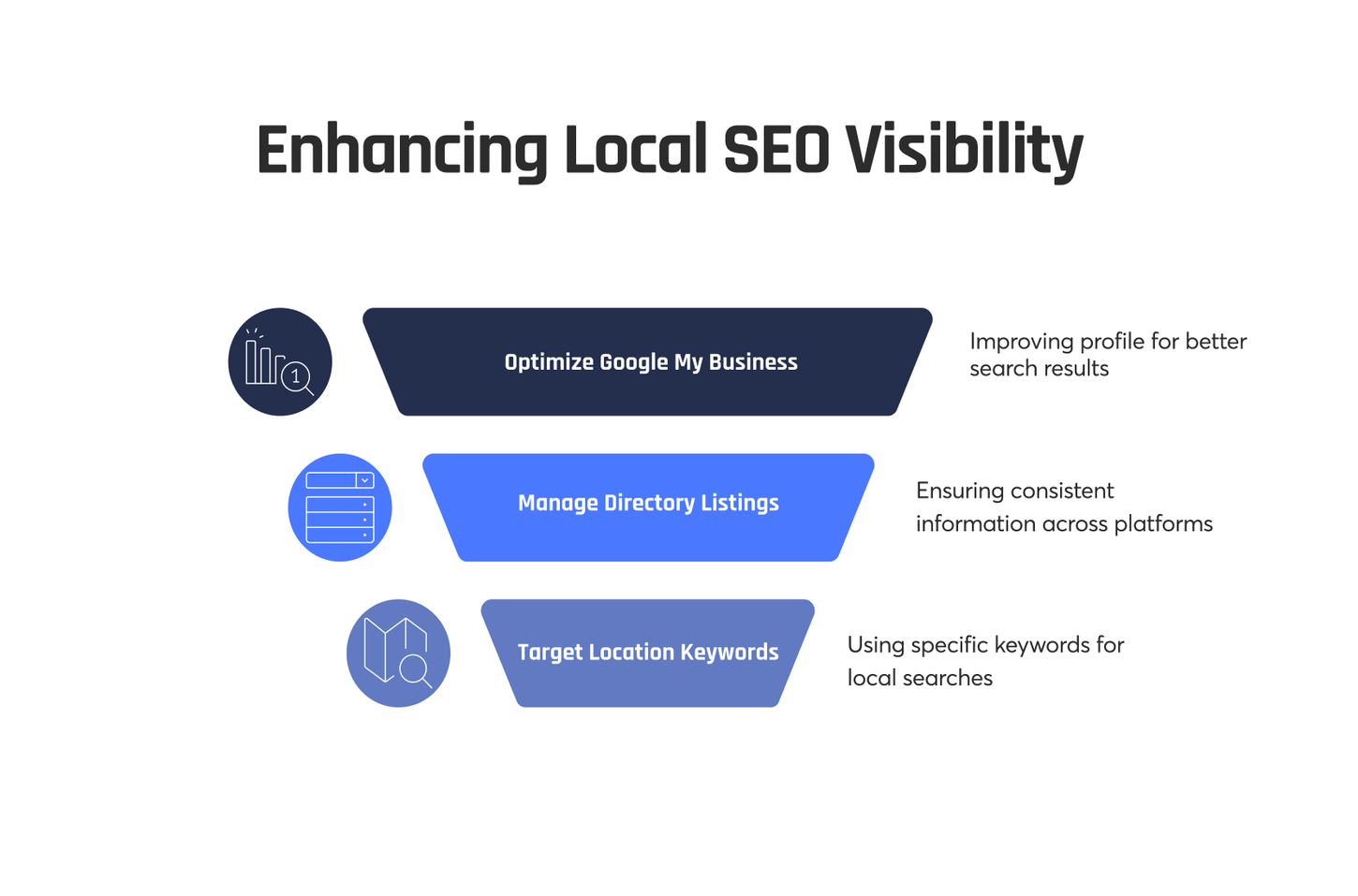Getting new clients is hard for financial advisors. SEO can help more people find your website. This guide shows how to use keywords, Google tools, and content to get noticed online.
Key Takeaways
-
SEO helps financial advisors show up higher in search results. This can get more clients.
-
Keywords are important. Use them on your website to attract the right visitors.
-
Make sure your site works well on mobile devices. A lot of people use phones for internet searches.
-
Off-page SEO, like getting links from other websites, is also key to better rankings.
-
Regularly update your site with good content and keywords to keep it fresh and attractive.
What Is SEO for Financial Advisors?
SEO for financial advisors is a way to make their websites show up higher in search engine results. This is important because when potential clients look for financial planning or investment advice, they usually start with a Google search.
SEO uses keywords, which are words people might type into a search engine when looking for financial services. By adding these relevant keywords to their website, financial advisors can attract more of the right kind of visitors.
Using SEO wisely means your site appears to the right people at the right time.
Good SEO strategy also involves making sure the website works well on mobile devices and loads fast. Since many people use their phones to find information online, having a mobile-friendly site helps keep them from leaving out of frustration with slow loading times or hard-to-navigate pages.
For financial advisors, this means that focusing on both what's on their website (like keywords) and how the site works (like speed and layout) can lead them to get more clients through online searches.
Why SEO Matters for Financial Advisors
Understanding SEO for financial advisors, it's time to grasp its immense importance. In today's digital era, the majority conduct their quest for financial advice via the internet.
If your website doesn't rank high on search engine results pages (SERPs), there exists a high probability of losing potential clients who are actively seeking the financial services you provide.
SEO assists in improving your standing in these pivotal search results. This promises heightened visibility and an enhanced opportunity of pulling in highly targeted traffic towards your website.
With effective keyword research and optimization strategies, you can connect with individuals who are specifically on the hunt for wealth management or other financial advisory services.
Sound SEO practices also foster trust among potential clients. Users often perceive sites ranked higher as more credible and authoritative. This perception is critical in the fiercely competitive financial services industry where trust significantly influences client decisions.
Moreover, local SEO tactics guarantee that when someone searches for "financial advisors near me" or similar local terms, your business pops up. This pushes both web traffic and foot traffic if you possess a physical office location, easing the process for locals to discover and opt your services over others'.
Keyword Research for Financial Advisors
Identifying relevant keywords is crucial for attracting more clients. Use tools for keyword research to uncover valuable search terms and attract highly targeted traffic to your financial advisory business.
Identifying relevant keywords
Finding the right keywords is a key step for financial advisors to connect with potential clients online. Start by thinking about what services you offer and what terms your prospective clients might use to search for these services.
For example, basic keywords like "financial planning" or "retirement advice" can be a good starting point. Then, consider more specific phrases that match the unique aspects of your service.
Use keyword research tools to dig deeper into which terms are popular and how hard it might be to rank for them. These tools show search volume, keyword difficulty, and even suggest related searches that could capture highly targeted traffic from people actively looking for financial advisory help.
By targeting both broad and local search terms, you improve your chances of appearing in front of the right audience at the right time.
Tools for keyword research
After identifying relevant keywords for financial advisory SEO, the next step is to use tools for keyword research. Effective keyword research tools help in discovering valuable keywords that potential clients are actively searching for.
Tools like Google Keyword Planner, SEMrush, and Ahrefs provide insights into specific keywords related to financial services SEO and web page optimization. These tools allow financial advisors to identify high-ranking keywords within their niche, ensuring a strong online presence and visibility on search engines.
Using keyword research tools is essential for uncovering the most effective keywords that can significantly improve a financial advisor's website visibility and rankings.
On-Page SEO for Financial Advisors

Optimizing your website structure and using relevant keywords can enhance your online visibility. Learn more about boosting your on-page SEO!
Optimizing website structure
Optimizing your website structure is crucial for improving its visibility and ranking on search engines like Google. Start by ensuring that your website has a clear and logical layout, making it easy for visitors to navigate.
Use relevant keywords in title tags, meta descriptions, and headers to indicate the purpose of each page to search engines. Moreover, ensure that your website is mobile-friendly as more users are accessing the internet through smartphones.
This not only improves user experience but also aligns with Google's preference for mobile-responsive websites.
Moreover, consider organizing your content into categories and subcategories, which can help both users and search engines understand the hierarchy of information on your site. Using structured data markup can also improve search engine understanding of your content, potentially leading to rich results being displayed in search listings.
Using keywords in title tags and meta descriptions
When enhancing your financial advisor website, it's essential to utilize relevant keywords in the title tags and meta descriptions. Integrating targeted keywords aids search engines in comprehending the content of your webpage, thereby increasing its likelihood of ranking for those terms.
For instance, including local keywords such as "financial advisor in [Your City]" or "fee-only financial advisor" in the title tags and meta descriptions can boost visibility in local search results.
Moreover, employing high-value keywords that correspond to the services you provide can draw more qualified traffic to your site. By strategically integrating these keywords into your titles and descriptions, you can elevate your website's visibility and ultimately attract more potential clients.
Ensuring mobile responsiveness
Mobile responsiveness is essential for financial advisors' websites. Considering the growing number of users accessing the internet via smartphones and tablets, it's crucial to guarantee that your website appears well and functions effectively on all devices, regardless of their screen size.
Google prioritizes mobile-friendly websites in its search results, so having a responsive design can positively impact your SEO rankings. This entails optimizing your website's layout, images, and content to seamlessly adapt to various screen sizes and load quickly on mobile devices.
Mobile responsiveness improves user experience, reduces bounce rates, and ultimately contributes to better search engine rankings for financial advisors.
Incorporating mobile responsiveness into your website also aligns with current digital trends - as of 2021, more than half of web traffic worldwide comes from mobile devices. When users have a positive experience on a financial advisor’s mobile site – one that loads quickly and displays properly – they are more likely to engage with the content or take desired actions such as contacting the advisor or scheduling an appointment.
Off-Page SEO for Financial Advisors
Off-Page SEO for Financial Advisors involves building backlinks from reputable websites and making use of guest posting opportunities to increase online visibility.
It also includes employing local SEO strategies, such as optimizing Google My Business profile and managing local business directory listings to attract clients in specific locations.
Building backlinks from authoritative websites
To improve the SEO for financial advisors, obtaining backlinks from authoritative websites is crucial. Backlinks serve as endorsements for your website's credibility and expertise.
When other reputable sites link back to yours, it signals search engines that your content holds value and should be ranked higher in search results. This helps in boosting your website's domain authority, which greatly influences its ranking factor.
By strategically building high-quality backlinks from well-respected sources within the financial advisory realm, you can significantly enhance your website's overall SEO performance and attract more potential clients searching for financial services online.
Incorporating strong backlinks into a comprehensive SEO strategy also plays a vital role in elevating the digital presence of financial advisor businesses and firms. It not only increases visibility but also establishes trust with search engines, leading to improved rankings on valuable keywords related to financial advisory services.
These efforts go beyond just digital marketing; they directly impact the growth of the business by ensuring that it stands out amidst the competitive landscape of ever-evolving search engine optimization practices within the realm of finance-related content creation and optimization.
Leveraging guest posting opportunities
When expanding reach, guest posting on other websites can be a valuable SEO strategy for financial advisors. By contributing high-quality content to authoritative sites in the finance realm, you can gain backlinks and increase brand visibility.
This not only helps in building credibility but also drives more traffic to your website. Also, guest posting provides an excellent opportunity to showcase your expertise and establish yourself as an industry authority.
It's a strategic way to connect with a wider audience and boost your search engine rankings while creating mutually beneficial relationships within the financial advisory community.
Local SEO Strategies
Optimizing Google My Business profile and managing local business directory listings are crucial for targeting location-specific keywords and reaching potential clients in your area.

These strategies can help improve your visibility to local prospects, ultimately boosting your chances of attracting more clients.
Optimizing Google My Business profile
To optimize your Google My Business profile for local SEO, complete every section with accurate and consistent information. Use relevant keywords in your business name, description, and categories to enhance visibility in local search results.
Encourage satisfied clients to leave positive reviews as they play a significant role in improving your local ranking. Regularly update posts about upcoming events, promotions, or news to engage potential clients and boost online presence.
Ensure your contact information including address, phone number, and website URL is up-to-date to make it easier for clients to find and connect with you.
Managing local business directory listings
After optimizing your Google My Business profile, it's crucial to focus on managing local business directory listings. This involves ensuring that your business information is accurately and consistently listed on various online directories like Yelp, Yellow Pages, and other relevant platforms.
Consistent NAP (Name, Address, Phone) details across these directories will help build credibility with search engines and potential clients. These listings also play a significant role in local SEO efforts, helping your financial advisory firm rank higher for location-specific searches.
By targeting location-specific keywords in these directory listings, you can improve the visibility of your firm within specific geographic areas.
Targeting location-specific keywords
After ensuring your local business directory listings are optimized, the next step is focusing on location-specific keywords to enhance your visibility in local searches. Incorporating phrases like "financial advisor in New York" or "top financial planner in Chicago" assists in helping prospective clients locate your services within their specific area.
By integrating these location-based terms in your website content and meta descriptions, you can improve the likelihood of being discovered by individuals in search of financial advisory services in their vicinity.
This strategic approach aligns with the growing trend of consumers conducting searches for services nearby.
Content Creation for SEO
When creating content for SEO, focus on writing engaging blog posts that attract readers. Regularly updating website content and naturally incorporating keywords are effective ways to improve your search engine rankings.
Writing high-quality blog posts
When developing top-notch blog posts for financial advisors, it's vital to concentrate on delivering valuable and informative content that resonates with the target audience. Integrating relevant keywords seamlessly within the content is vital for improving search engine rankings.
Regularly updating the website with fresh, insightful blog posts not only demonstrates industry expertise but also draws in and engages potential clients. Using SEO tools can help identify trending topics and keywords, enabling more focused content creation that meets the needs of prospective clients seeking financial advice.
Creating captivating blog posts involves grasping the challenges and concerns of the target audience while providing actionable solutions. Adopting a client-focused approach by addressing common financial questions in an easy-to-understand manner adds value and fosters confidence with readers.
By integrating these strategies into their content creation endeavors, financial advisors can effectively boost their visibility in search engine results and attract more potential clients to their websites.
Updating website content regularly
After drafting top-notch blog posts, another critical part of an effective SEO strategy for financial advisors involves regularly refreshing website content. This ongoing process ensures that the website remains up to date and relevant to both visitors and search engines.
By integrating valuable content related to financial advisory services, such as investment insights, retirement planning guidance, or updates on regulatory shifts in the industry, financial advisors can draw more traffic and maintain their audience's interest.
Seamlessly incorporating relevant keywords within the refreshed content also aids in enhancing search engine rankings over time. Keeping the website current with new information not only delivers benefits to visitors but also indicates to search engines that the site is active and worthy of frequent indexing.
This consistent updating of high-quality content perfectly aligns with Google's preference for new and valuable material. Websites consistently offering users helpful and informative resources tend to perform well in search results.
Incorporating keywords naturally
After updating website content regularly, the next crucial step is to integrate keywords seamlessly. Keywords are the terms and phrases that people use when searching for information on search engines like Google.
To enhance your website's visibility and attract more clients, it's essential to include these relevant keywords in your content.
When creating blog posts or updating website pages, ensure to smoothly incorporate your chosen keywords into the text. Avoid cramming them in an artificial manner; instead, focus on using them in a way that sounds natural and provides value to your readers.
By doing so, you can improve your website's ranking on search engine results pages while delivering meaningful content to potential clients.
Technical SEO Essentials
Improve website load speed, fix broken links, and use structured data for better rankings. Learn more about Technical SEO Essentials.
Improving website load speed
Improving website load speed is crucial for SEO. Rapid-loading websites rank higher on search engines and provide a better user experience. To achieve this, optimize image sizes, enable browser caching, and minimize HTTP requests.
Indeed, 40% of people abandon a website that takes more than 3 seconds to load. Implementing these strategies can significantly boost user engagement and reduce bounce rates.
Loading time is also crucial for mobile users since mobile traffic accounts for more than half of web traffic worldwide. Therefore, optimizing your website's load speed not only enhances SEO but also improves the overall user experience and conversion rates, making it crucial for financial advisors aiming to attract more clients through their online presence.
Fixing broken links
Fixing broken links on your website is crucial for SEO. Fixing broken links can enhance user experience and search engine rankings. Utilize tools like Google Search Console to identify and repair broken links promptly.
Regularly inspect and update your links to ensure a smooth browsing experience for users and improved search engine performance.
Slow website load speed, disrupted user journey, diminished credibility - all of these are direct consequences of unresolved broken links. It's not just about the inconvenience it causes users; it significantly impacts how your site ranks on search engines like Google, which directly affects the visibility of your financial advisor business online.
Keep in mind that addressing this issue diligently can help improve the overall health and effectiveness of your website, contributing positively to its success in attracting more clients through strong SEO practices specific to financial advisors.
Using structured data for better rankings
Structured data, also referred to as schema markup, aids search engines in comprehending your content more effectively. By incorporating structured data into your website, you furnish specific particulars about your business or services directly to search engines.
This can lead to improved search outcomes and enhanced rankings for pertinent queries. Employing structured data can result in the display of more detailed snippets in search engine results pages (SERPs), making your website more captivating and enlightening to potential visitors.
Incorporating structured data is vital for financial advisors looking to enhance their online presence. It assures that search engines precisely interpret the information on your site, ultimately contributing to a more robust SEO strategy aimed at attracting potential clients seeking financial advisory services online.
Looking ahead in our discussion, let's explore the significance of tracking and evaluating SEO performance.
Tracking and Measuring SEO Performance
Tracking and Measuring SEO Performance involves using tools like Google Search Console for monitoring keyword rankings and analyzing website traffic with Google Analytics. It's important to regularly track these metrics to gauge the effectiveness of your SEO efforts, which can help refine your strategies for better results in attracting potential clients.
Using Google Search Console
Google Search Console proves to be an invaluable tool for monitoring and enhancing your website's SEO performance. It offers key insights into keyword rankings, website traffic, and technical issues that could impact your site's visibility on search engines.
Regularly assessing the data in Google Search Console enables financial advisors to make informed choices to bolster their SEO strategy. This involves pinpointing the keywords driving traffic to their site, rectifying any crawl errors or indexing issues, and comprehending their website's performance in search results.
Financial advisors can leverage Google Search Console to scrutinize impressions, clicks, and click-through rates for specific keywords. This data aids in understanding how their site is presented in search results and spotting prospects to refine their content and meta descriptions for improved performance.
Furthermore, Google Search Console furnishes vital information about backlinks directing to the site, enabling financial advisors to evaluate the quality of inbound links and take appropriate action in case of any spammy or detrimental links impacting their SEO endeavors.
Monitoring keyword rankings
Tracking keyword rankings is essential for the success of your SEO efforts. It offers insight into how well your website is performing in search engine results. By using tools like Google Search Console, you can monitor how your chosen keywords are ranking and make adjustments to improve your position.
Analyzing keyword rankings helps you understand which strategies are effective and identify areas that need improvement, enabling you to refine your SEO approach for better visibility and higher click-through rates on search engine results pages.
Moreover, regular monitoring of keyword rankings allows you to stay updated on changes in search trends and adapt your content strategy accordingly. This ensures that your website remains competitive and relevant in the constantly changing landscape of online searches.
By integrating these best practices into a robust SEO strategy, financial advisors can improve their online presence, attract more clients, and establish themselves as authoritative sources within their niche.
Analyzing website traffic with Google Analytics
After observing keyword rankings, the next step involves examining website traffic using Google Analytics. This robust tool offers comprehensive insights into user interactions on your website.
It allows you to monitor visitor numbers, their sources, popular pages, and duration of their visits. By utilizing this information, financial advisors can make well-informed decisions regarding their SEO strategy and content creation efforts.
Through the analysis of website traffic using Google Analytics, financial advisors can acquire valuable insights into user behavior, encompassing bounce rates and conversion rates.
This information facilitates a more strategic approach to enhancing web pages and elevating the overall user experience. It also empowers advisors to pinpoint the most effective marketing strategies in driving traffic and conversions, thus optimizing resource allocation for maximum impact.
Common SEO Mistakes to Avoid
Avoiding common SEO mistakes is crucial for the success of financial advisors. It can impact your rankings and organic traffic, affecting potential client acquisition and business growth.
Keyword stuffing
Keyword stuffing is when a web page is filled with excessive keywords or numbers to manipulate search engine rankings. This can negatively impact user experience and is against Google's guidelines.
It's important to use relevant keywords naturally and avoid overloading content with them, as this can lead to penalties from search engines. Instead, focus on creating high-quality, engaging content that incorporates keywords in a natural way for better SEO results.
While it may be tempting to stuff web pages with keywords to improve rankings, this outdated tactic can harm your website's performance in the long run. Search engines are designed to identify and penalize keyword stuffing, so it's best to prioritize providing valuable content that resonates with your target audience while using relevant keywords strategically throughout.
Ignoring local SEO opportunities
Transitioning from the pitfalls of keyword stuffing, financial advisors should not overlook the significant potential of local SEO opportunities. Local search queries are substantial, with 46% of all Google searches looking for local information.
Optimizing Google My Business profile and managing local business directory listings can significantly boost visibility within targeted geographic locations. For example, focusing on location-specific keywords like "fee-only financial advisor" or "financial advisor in [specific area]" can attract relevant traffic and improve conversion rates.
Ignoring such local SEO tactics could result in missing out on valuable client acquisition opportunities.
Neglecting technical SEO
Neglecting technical SEO can harm your website's performance. It affects aspects like load speed and broken links, which impact user experience. So, including structured data is crucial for better rankings.
Failing to address these issues can lead to decreased visibility in search engine results. Users might also struggle with slow-loading pages or encounter broken links, resulting in a negative impression of your site.
To avoid this, regularly reviewing and maintaining technical aspects is essential for a strong financial advisors SEO strategy.
Outsourcing SEO for Financial Advisors
Consider outsourcing SEO for Financial Advisors to save time and gain expertise. Read more about this on our blog.
Choosing the right SEO agency
When choosing the right SEO agency, look for a company that specializes in financial advisor SEO services. Consider their experience in optimizing websites for financial advisors and their track record of delivering results.
It's essential to find an agency that understands the unique needs of financial advisors and can tailor their strategies accordingly. Look for agencies offering comprehensive SEO services like on-page optimization, off-page link building, local SEO, and technical SEO.
Ensure that the chosen agency has a strong portfolio of successful clients within the financial industry. Check if they have expertise in on-page SEO, Google Business Profile optimization, marketing strategy development, high-quality content creation, website optimization, and other relevant areas mentioned in your keyword list.
Understanding what to expect from an SEO provider
When outsourcing SEO for financial advisors, it's crucial to choose a provider with a strong SEO strategy. A reputable SEO agency will offer on-page and off-page optimization, high-quality content creation, local SEO strategies, and technical SEO essentials.
They should also provide tracking and measuring of SEO performance through tools like Google Search Console and Google Analytics. The right provider will help avoid common SEO mistakes such as keyword stuffing and neglecting technical or local opportunities.
Conclusion
In the competitive world of financial advising, SEO is a powerful tool. By optimizing your online presence, you can attract more clients and enhance your visibility. From local strategies to technical essentials, understanding and implementing SEO will help you stand out in the digital landscape.
Embrace these principles — they could be the game-changer for your financial advisory business!
FAQs
1. What is SEO for financial advisors?
SEO, or Search Engine Optimization, helps fee-only financial advisors get their services seen online. It includes on-page and off-page strategies to improve your site's visibility in search engines.
2. How can a financial advisor use on-page SEO?
On-page SEO involves optimizing elements within a website, like high-quality content and keywords. A financial advisor could work with an SEO consultant to ensure their site appeals both to clients and search engines.
3. Why is off-page SEO important for a fee-only financial advisor?
Off-page SEO refers to actions taken outside of your own website that impact rankings within the search engine results page. This might include linking from other sites which can build credibility and drive traffic back to the advisor's site.
4. Can I do my own Financial Advisor SEO or should I hire an expert?
While it's possible to learn about and implement some basic SEO practices yourself, hiring an experienced seo consultant will likely yield better results as they have deep knowledge of how search engines like Google operate.



